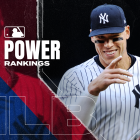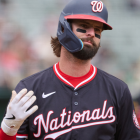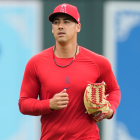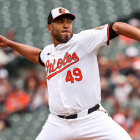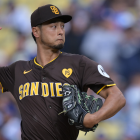NEW YORK -- At 82-42, the New York Yankees come into Saturday with the best record in baseball (tied with the Dodgers) and a comfortable 10 1/2-game lead in the AL East. They've done that despite a barrage of injuries that has seen them lose 1,952 man games to the injured list, 530 more than any other team, according to Spotrac.com.
The Yankees have baseball's best record in August (14-3) and they've done that even though Aaron Judge, their best all-around player, is mired in an ugly slump that dates back to last month. Judge is 14 for 84 (.167) with 31 strikeouts in his last 22 games, and he has one home run since July 19. His overall season batting line sits at a very good but un-Judge-like .262/.387/.452.
Friday night against the Indians (NYY 3, CLE 2), Judge had his best game in quite a while, going 2 for 3 with a double and a walk. It was the first time he reached base three times in a game without the benefit of an intentional walk since July 23. "Just a normal day," Judge said with a smile following Friday's game when asked how it felt to get two hits.
"Very (encouraged) for him to get some results," manager Aaron Boone added after Friday's win. "Smokes a ball to left, smokes two balls to right -- one that (Yasiel) Puig ends up catching -- and then working a really good walk off of (Adam) Cimber, who's a tough at-bat for right-handed hitters."
Judge's big game Friday was a welcome sight for the Yankees, to be sure, but one game does not mean he has snapped out of a slump that is nearly a month old. There is still work to be done on Judge's part.
What is the root cause behind Judge's slump? And are there reasons to be optimistic other than Friday's game? Let's talk this out.
The Yankees say Judge is not injured
A left oblique strain sidelined Judge exactly two months from April 21 to June 21. He mashed upon his return -- Judge went 30 for 91 (.330) with six home runs and a .460 on-base percentage in his first 26 games off the injured list -- before sliding into his current slump. Everything with the oblique seemed good.
Speaking from experience, Yankees special advisor Carlos Beltran cautioned a severe oblique injury may not fully heal during the season, however. It can take an offseason to get right. Here's what Beltran told NJ.com's Brendan Kuty in May:
"If he gets to 100 percent, then that's great," Beltran said. "At least in my case, I never got to 100 percent. I felt it through the end."
...
"That pain, it won't go (away) until maybe the end of the season," Beltran said. "That's how obliques work. It's a muscle you use all the time, especially all the power he generates from the right side. It's a muscle that is active all the time. It's active when you throw, when you run the base paths.
That all said, Judge and the Yankees insist he is healthy. When asked whether his star right fielder is playing through an injury earlier this week, GM Brian Cashman told reporters, "That box has been checked and asked. He says he feels good."
No player is 100 percent physically at this point in the season. Everyone is playing through aches and pains, some worse than others. It is entirely possible Judge is hiding an injury, though he has been taking extra pregame batting practice against a high-velocity pitching machine on the field this past week, and that doesn't seem like something a player nursing an injury would do.
"He doesn't look like he's hurt," a scout told Ken Davidoff of the New York Post recently. "He looks rusty. He definitely looked a little behind pitches."
His exit velocity remains off the charts
Need another reason to believe Judge isn't injured? He is still hitting the absolute snot out of the ball. Judge's ability to hit the ball hard is almost unmatched and his exit velocity remains the best in baseball, and it is not particularly close. Here is the exit velocity leaderboard (min. 100 batted balls):
- Aaron Judge, Yankees: 96.8 mph
- Nelson Cruz, Twins: 94.2 mph
- Miguel Sano, Twins: 93.5 mph
- Christian Yelich, Brewers: 93.4 mph
- Yoan Moncada, White Sox and Josh Donaldson, Braves: 93.0 mph
Since the start of his 22-game slump, Judge has a 93.8 mph average exit velocity, which is below his season average but still very good. He's been hitting the ball hard all year. Had Judge suddenly stopped hitting the ball hard, that would be a cause for concern. That would suggest he is playing hurt, or so fouled up mechanically that hard contact is no longer possible.
"I'm still making good contact," Judge told Dan Martin of the New York Post earlier this month. "I think I lead the league in exit velo, whatever that means."
Judge says it's mechanical
So, if Judge is not hurt, and he's still hitting the ball extremely hard, then what gives? In all likelihood Judge is slumping for the same reason most players slump: He's out of whack mechanically and his timing is off. That's Judge's explanation, anyway.
"I very rarely get one over the middle, and when I do I have to make sure I do damage on it," Judge said Thursday. "When your mechanics or timing's a little off, it makes it a tough battle. Have to just keep grinding. It sucks right now but we'll get through it."
Without providing details, Judge acknowledged making mechanical adjustments at the plate with hitting coach Marcus Thames last month -- "I feel good with the changes, it just takes a couple of days to come into effect," he told Dan Martin of the New York Post at the time -- so he is working at it, even if the results aren't there yet.
Perhaps the best indication Judge is out of sync is his ground ball rate. During his monster 2017 rookie season, only 34.9 percent of his balls in play were on the ground. Last year it was 41.7 percent. This year? 43 percent, including 46.2 percent since June 1. When you hit the ball as hard as Judge, you want to get it airborne. He hasn't been able to though.
Here is a look at Judge earlier this year, before the oblique injury -- Judge hit .288/.404/.521 before landing on the injured list -- compared to Judge during his recent slump. The screen grabs on the top row are from March 31. The bottom row is from August 14. Same pitcher (Dylan Bundy), same pitch (four-seam fastball), and same ballpark to avoid camera angle inconsistency:
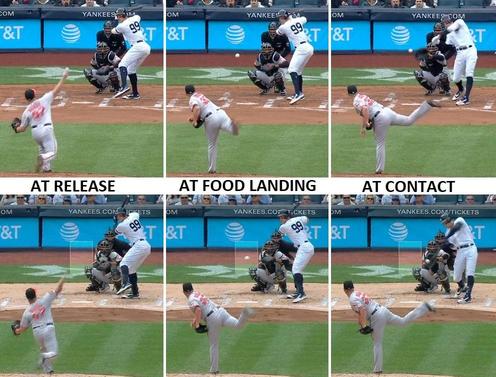
Obvious caveat: I am no hitting coach or swing mechanic. To my untrained eye, it appears Judge is standing a little more upright when the pitch is released, and that his front foot touched down earlier in April than it did in August. Look how close to the plate the ball is in August when Judge finally gets his foot down. Also, it looks like his hips are a bit more open at the point of contact in August. Could be that he's getting his foot down late and having to rush his swing to compensate, and flying open as a result.
Getting the foot down early seems like it would be a easy fix, but there's a lot of muscle memory involved here, and when hitters have to start thinking about their stride, they're in trouble. It should all come natural. Hitting should be all reaction. When you have to start thinking about your hitting mechanics at the plate, you have that much less time to react. It could take some time to correct an issue like this, assuming this is Judge's issue.
"You make adjustments, but if you make a little adjustment here, it takes a couple of games to kick in," Judge said earlier this week. "You make adjustment here, it takes a couple games. The biggest thing is just to keep it simple and just focus on the basics."
I know Yankees fans and fantasy owners don't want to hear it, but I think the solution to Judge's slump is just be patient. Judge is a better pure hitter than he gets credit for -- players his size are easy to stereotype as brute mashers -- so be patient and trust him to work through it. As long as he's not hurt, and everyone insists he's not, it's only a matter of time until Judge locks in.
The Yankees have a comfortable lead in the AL East, so Judge's slump has not cost them much in the standings, if it's even cost them at all. New York has won 15 of their last 18 games, after all. Still, the Yankees want their top slugger to right the ship and soon, so he can finish the regular season strong and carry it over into the postseason.
"The game's hard," Boone said Thursday. "Over the course of the season, it gets the greatest of players, which certainly Judgey is. I'm confident he'll grind his way through it and hopefully soon."

















